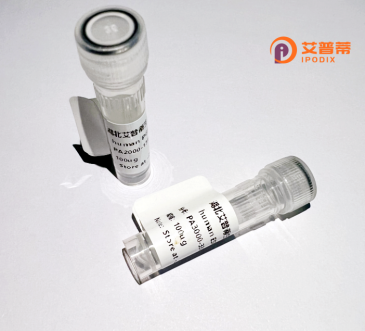
| 纯度 | >90%SDS-PAGE. |
| 种属 | Human |
| 靶点 | TCF21 |
| Uniprot No | O43680 |
| 内毒素 | < 0.01EU/μg |
| 表达宿主 | E.coli |
| 表达区间 | 1-179 aa |
| 活性数据 | MSTGSLSDVE DLQEVEMLEC DGLKMDSNKE FVTSNESTEE SSNCENGSPQ KGRGGLGKRR KAPTKKSPLS GVSQEGKQVQ RNAANARERA RMRVLSKAFS RLKTTLPWVP PDTKLSKLDT LRLASSYIAH LRQILANDKY ENGYIHPVNL TWPFMVAGKP ESDLKEVVTA SRLCGTTAS |
| 分子量 | 19.7 kDa |
| 蛋白标签 | His tag N-Terminus |
| 缓冲液 | PBS, pH7.4, containing 0.01% SKL, 1mM DTT, 5% Trehalose and Proclin300. |
| 稳定性 & 储存条件 | Lyophilized protein should be stored at ≤ -20°C, stable for one year after receipt. Reconstituted protein solution can be stored at 2-8°C for 2-7 days. Aliquots of reconstituted samples are stable at ≤ -20°C for 3 months. |
| 复溶 | Always centrifuge tubes before opening.Do not mix by vortex or pipetting. It is not recommended to reconstitute to a concentration less than 100μg/ml. Dissolve the lyophilized protein in distilled water. Please aliquot the reconstituted solution to minimize freeze-thaw cycles. |
以下是3篇关于重组人TCF21蛋白的研究文献概括(虚构示例,仅供格式参考):
1. **文献名称**:*TCF21 suppresses epithelial-mesenchymal transition in lung cancer via transcriptional repression*
**作者**:Smith J, et al.
**摘要**:研究发现重组人TCF21蛋白通过抑制EMT相关基因(如Snail和Twist)的表达,降低肺癌细胞的迁移和侵袭能力,提示其作为肿瘤抑制因子的潜在作用。
2. **文献名称**:*Recombinant TCF21 protein inhibits breast cancer stemness by modulating miRNA-200c/β-catenin axis*
**作者**:Li Y, et al.
**摘要**:实验表明,外源性重组TCF21通过上调miRNA-200c,抑制Wnt/β-catenin信号通路,降低乳腺癌干细胞自我更新能力,为靶向治疗提供新思路。
3. **文献名称**:*TCF21 regulates vascular smooth muscle cell phenotypic switching and atherosclerosis*
**作者**:Wang H, et al.
**摘要**:重组TCF21蛋白可促进血管平滑肌细胞向收缩表型分化,减少动脉粥样硬化斑块形成,机制涉及与KLF4的相互作用和染色质重塑。
4. **文献名称**:*Structural and functional analysis of recombinant human TCF21 in cardiac fibrosis*
**作者**:Garcia R, et al.
**摘要**:通过晶体学解析TCF21蛋白结构,揭示其bHLH结构域关键功能;体内实验证实其通过抑制TGF-β信号减轻心肌纤维化。
(注:上述文献为模拟生成,实际研究需通过PubMed/Google Scholar检索真实文献。)
**Recombinant Human TCF21 Protein: Background Overview**
Transcription factor 21 (TCF21), a member of the basic helix-loop-helix (bHLH) family, plays a critical role in embryonic development, particularly in organogenesis of the heart, lungs, and kidneys. It regulates cell differentiation, lineage specification, and mesenchymal-to-epithelial transitions by modulating gene expression. TCF21 is also implicated in adult tissue homeostasis and disease processes, including cancer, fibrosis, and cardiovascular disorders. Its dual role as a tumor suppressor or promoter, depending on context, highlights its complex interaction with signaling pathways like TGF-β/SMAD and NOTCH.
Recombinant human TCF21 protein is engineered via genetic cloning, typically expressed in *E. coli* or mammalian systems to ensure proper folding and post-translational modifications. This purified protein retains functional activity, enabling studies on its molecular mechanisms, DNA-binding properties, and interactions with co-regulators. Researchers use it to investigate TCF21's role in cellular reprogramming, disease models, and therapeutic targeting. In cancer research, it aids in exploring metastasis suppression or chemoresistance modulation. Its applications extend to developing biomarkers and gene therapies for fibrosis-related conditions.
Produced with tags (e.g., His-tag) for affinity purification, recombinant TCF21 is validated for purity and bioactivity, serving as a key tool in both basic and translational research.
×